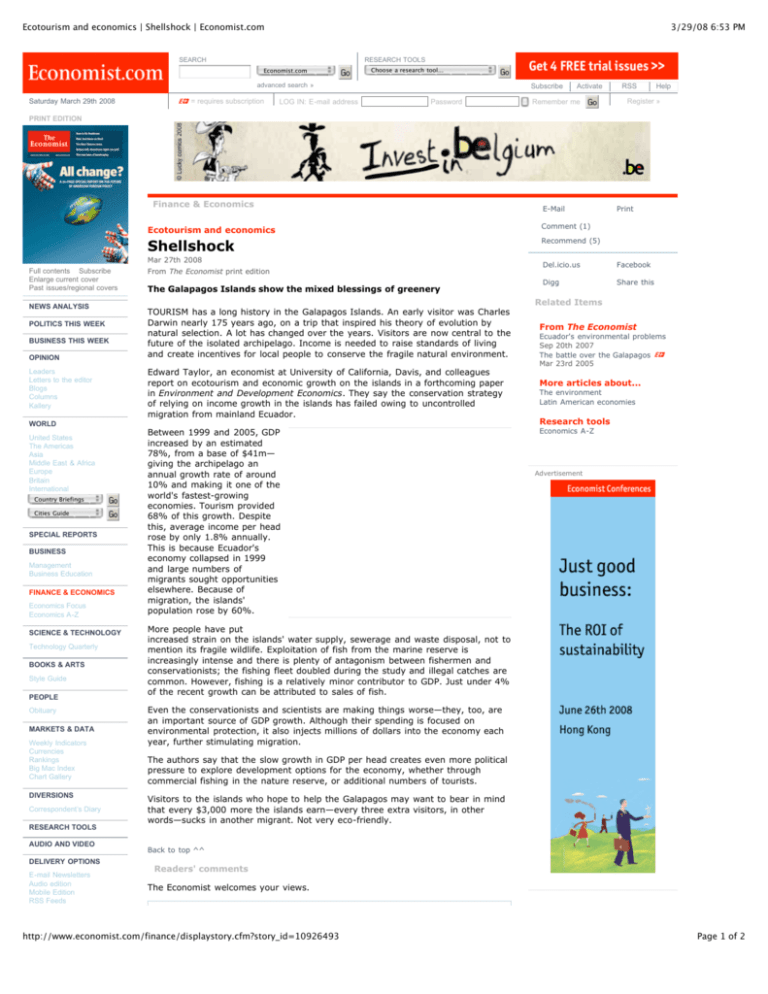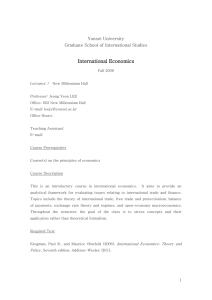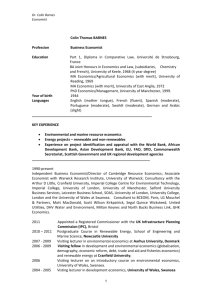
Ecotourism and economics | Shellshock | Economist.com
Skip
Skip
Quick
Quick
3/29/08 6:53 PM
SEARCH
RESEARCH TOOLS
Economist.com
Choose a research tool...
advanced search »
Saturday March 29th 2008
= requires subscription
LOG IN: E-mail address
Subscribe
Password
Activate
Remember me
RSS
Help
Register »
PRINT EDITION
Finance & Economics
Ecotourism and economics
Shellshock
Recommend (5)
Mar 27th 2008
Full contents Subscribe
Enlarge current cover
Past issues/regional covers
NEWS ANALYSIS
POLITICS THIS WEEK
BUSINESS THIS WEEK
OPINION
Leaders
Letters to the editor
Blogs
Columns
Kallery
WORLD
United States
The Americas
Asia
Middle East & Africa
Europe
Britain
International
Country Briefings
Cities Guide
SPECIAL REPORTS
BUSINESS
Management
Business Education
FINANCE & ECONOMICS
Economics Focus
Economics A-Z
SCIENCE & TECHNOLOGY
Technology Quarterly
BOOKS & ARTS
Style Guide
PEOPLE
Obituary
MARKETS & DATA
Weekly Indicators
Currencies
Rankings
Big Mac Index
Chart Gallery
DIVERSIONS
Correspondent’s Diary
RESEARCH TOOLS
AUDIO AND VIDEO
DELIVERY OPTIONS
E-mail Newsletters
Audio edition
Mobile Edition
RSS Feeds
E-Mail
Comment (1)
From The Economist print edition
The Galapagos Islands show the mixed blessings of greenery
TOURISM has a long history in the Galapagos Islands. An early visitor was Charles
Darwin nearly 175 years ago, on a trip that inspired his theory of evolution by
natural selection. A lot has changed over the years. Visitors are now central to the
future of the isolated archipelago. Income is needed to raise standards of living
and create incentives for local people to conserve the fragile natural environment.
Edward Taylor, an economist at University of California, Davis, and colleagues
report on ecotourism and economic growth on the islands in a forthcoming paper
in Environment and Development Economics. They say the conservation strategy
of relying on income growth in the islands has failed owing to uncontrolled
migration from mainland Ecuador.
Between 1999 and 2005, GDP
increased by an estimated
78%, from a base of $41m—
giving the archipelago an
annual growth rate of around
10% and making it one of the
world's fastest-growing
economies. Tourism provided
68% of this growth. Despite
this, average income per head
rose by only 1.8% annually.
This is because Ecuador's
economy collapsed in 1999
and large numbers of
migrants sought opportunities
elsewhere. Because of
migration, the islands'
population rose by 60%.
Print
Del.icio.us
Facebook
Digg
Share this
Related Items
From The Economist
Ecuador's environmental problems
Sep 20th 2007
The battle over the Galapagos
Mar 23rd 2005
More articles about...
The environment
Latin American economies
Research tools
Economics A-Z
Advertisement
More people have put
increased strain on the islands' water supply, sewerage and waste disposal, not to
mention its fragile wildlife. Exploitation of fish from the marine reserve is
increasingly intense and there is plenty of antagonism between fishermen and
conservationists; the fishing fleet doubled during the study and illegal catches are
common. However, fishing is a relatively minor contributor to GDP. Just under 4%
of the recent growth can be attributed to sales of fish.
Even the conservationists and scientists are making things worse—they, too, are
an important source of GDP growth. Although their spending is focused on
environmental protection, it also injects millions of dollars into the economy each
year, further stimulating migration.
The authors say that the slow growth in GDP per head creates even more political
pressure to explore development options for the economy, whether through
commercial fishing in the nature reserve, or additional numbers of tourists.
Visitors to the islands who hope to help the Galapagos may want to bear in mind
that every $3,000 more the islands earn—every three extra visitors, in other
words—sucks in another migrant. Not very eco-friendly.
Back to top ^^
Readers' comments
The Economist welcomes your views.
http://www.economist.com/finance/displaystory.cfm?story_id=10926493
Page 1 of 2
Ecotourism and economics | Shellshock | Economist.com
3/29/08 6:53 PM
View all comments (1)
Screensaver
Add your comment
CLASSIFIED ADS
Advertisement
Economist Intelligence Unit
Economist Conferences
The World In
Intelligent Life
CFO
Roll Call
European Voice
EuroFinance
Economist Diaries and
Business Gifts
Reprints and Permissions
Advertisement
Classified ads
Jobs
SPPS Officer
£20,541 - £24,516
Kingston upon
Thames 36 hours per
week The Policy
&a....
Sponsors' feature
Business /
Consumer
Build Green CEE 2324 April
Build Green CEE: 2324 April 2008 Energy
Efficient & Ecological
....
Tenders
Property
Jobs
ANNOUNCEMENT
FOR AWARDING A
CONTRACT FOR
PUBLIC
PROCUREMENT
GOVERNMENT OF
THE REPUBLIC OF
MACEDONIA GEN....
Pine Lake Marina
holiday resort in
Sedgefield, Garden
Route
Duly authorised by
the shareholders of
GRC Mari....
Vacancies for senior
ODI researchers
on humanitarian
policy Would you like
to help shape the
futur....
About sponsorship »
Business /
Consumer
WSI Internet - Own
the #1 ranked
Internet Marketing
Business
Take Control....
About Economist.com | About The Economist | Media Directory | Staff Books | Advertising info | Career opportunities | Contact us
Copyright © The Economist Newspaper Limited 2008. All rights reserved. Advertising Info | Legal disclaimer | Accessibility | Privacy policy | Terms & Conditions | Help
http://www.economist.com/finance/displaystory.cfm?story_id=10926493
Page 2 of 2












